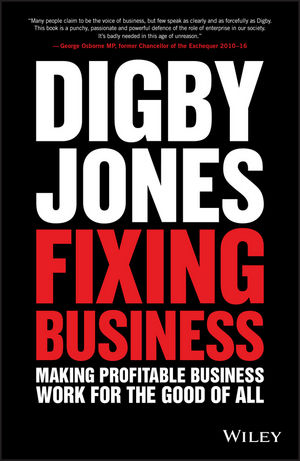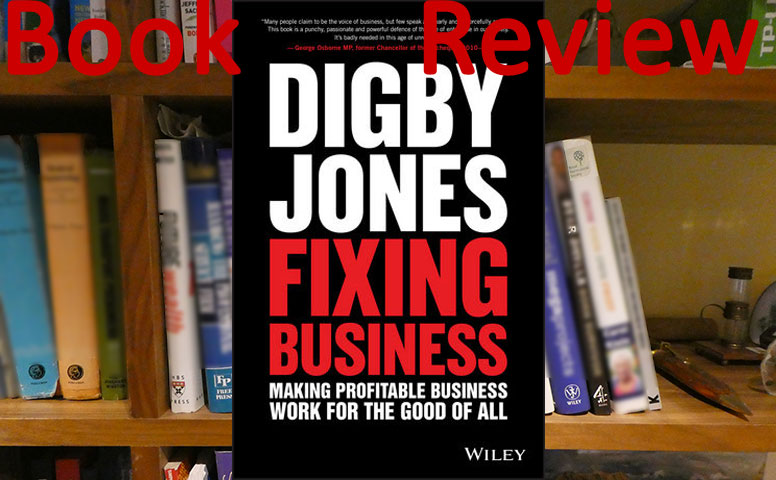04 January 2018
Fixing Business by Digby Jones
‘Making Profitable Business work for the good of all’
Book reviewed by Frank O’Nomics
 At the heart of this book Digby Jones creates a strong case for having a market-based economy where Business (he insists in the upper-case) is profitable. He argues that this is in the interests of the owners (clearly), the employees (who need work) and the consumers who need the products. All of these elements pay tax, either on their profit, their wages or, in the case of consumers, VAT. These taxes then go to fund our infrastructure, welfare, healthcare and pensions, so the greater the profit the greater the benefit to society as a whole. Why then has Business got such a bad press, and what can be done to fix it? Lord Jones delivers simple, although at times obvious, arguments both in support of Business and for ways in which it can be improved.
At the heart of this book Digby Jones creates a strong case for having a market-based economy where Business (he insists in the upper-case) is profitable. He argues that this is in the interests of the owners (clearly), the employees (who need work) and the consumers who need the products. All of these elements pay tax, either on their profit, their wages or, in the case of consumers, VAT. These taxes then go to fund our infrastructure, welfare, healthcare and pensions, so the greater the profit the greater the benefit to society as a whole. Why then has Business got such a bad press, and what can be done to fix it? Lord Jones delivers simple, although at times obvious, arguments both in support of Business and for ways in which it can be improved.
In identifying the problem he focuses on the reputation of Business, which has been undermined by deceit, inefficiency and foolishness. Where Business has lost its way is in failing to put clients or customers interests ahead of their own. The pursuit of short-term gains and excessive executive pay are not sustainable in the long-term and there is a need for regulation to contain such tendencies, but there is also a sound commercial logic in firms improving their reputations by building strong leadership with core ethical values and better communication to ensure that the world knows what they are achieving. On top of this an investment in people, to further develop skills, and in technology is the only way that UK Business can compete on the world stage.
None of this is contentious and Lord Jones does have a solid blueprint for fixing Business, put in a logical and simple way. In particular, the putting of pressure on large firms that use small firms as sources of cheap finance (by paying them later than they could or should) highlights an important point regarding corporate bullying. However, the manner in which his solutions are delivered will irritate many and there are elements of his proposals that are questionable to say the least. Digby Jones does not get much wrong; we know this because he tells us – repeatedly. From Brexit to the Trump victory he claims to have called it correctly. For example, he says, “that was the day that I knew Trump would become… President” – a claim he makes even before Trump won the Republican nomination. At least that is how he sees it. Confidence and plain speaking are admirable qualities, but arrogance and hubris are not, and there is the air of papal infallibility surrounding Fixing Business.
Beyond the manner in which the policies are delivered there are also unpalatable elements within them. Education and skills should be at the heart of any manifesto for Business, but the withholding of some element of benefits to parents whose children don’t hit key metrics, as advocated by Lord Jones, is a dangerous policy that could easily result in some very negative consequences. His ideas dismissing the state control of railways, while arguing the importance of huge infrastructure investment in high speed rail, will cause some to point out that it is hard to have one without the other. Other difficult areas include the privatisation of overseas aid, as apparently civil servants don’t have a “value-for-money” ethic, and a pro bono use of Business to solve the ills of the NHS. The final difficult pill for many to swallow will be his approach to Brexit, where he advocates leaving the EU, the single market and the customs union as quickly as possible.
Digby Jones argues that fixing business can solve most of our society’s problems and it is hard to disagree, but many will not be comfortable with either the efficacy or motivations behind his solutions. This book describes the issues that need to be fixed and why in a very effective way, the manner of the fixing will, however, incite a great deal of discussion.


